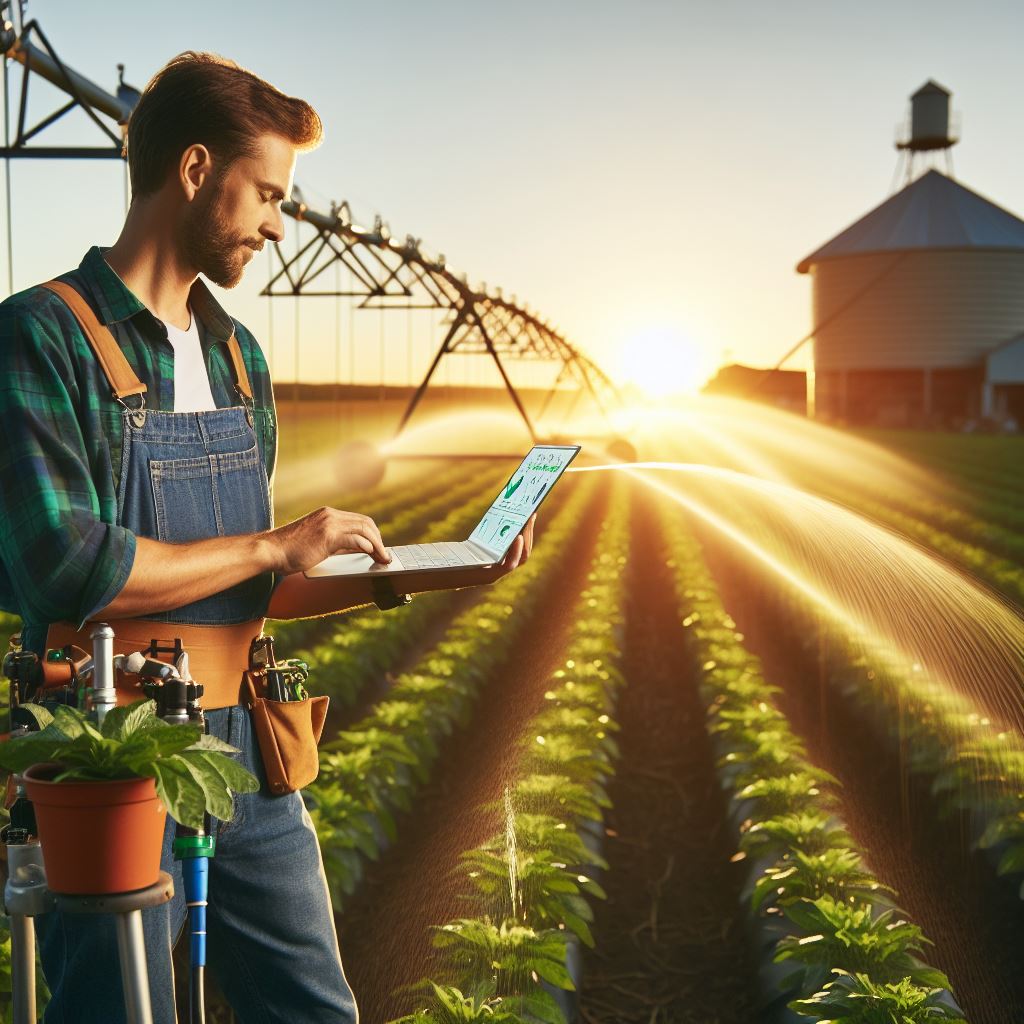Introduction
Smart watering techniques are essential for small-scale farms, as they promote efficient water usage.
Implementing these techniques is crucial in ensuring the optimal growth and yield of crops.
By using technology and innovative approaches, farmers can save water, reduce costs, and increase productivity.
Importance of smart watering techniques for small-scale farms
Water scarcity and the need to conserve resources make smart watering techniques vital for small-scale farms.
These techniques help farmers overcome the challenges of limited water supply and unpredictable weather conditions.
By properly managing irrigation systems, farmers can maximize water utilization and sustain their farm’s productivity.
Brief overview of the benefits of smart watering
Smart watering offers numerous advantages for small-scale farms.
Firstly, it helps prevent water wastage by providing precise amounts of water that plants require.
This conserves water resources and reduces environmental impact. Secondly, it minimizes the risk of plant diseases caused by excessive moisture.
By optimizing watering schedules and methods, farmers can avoid overwatering and maintain healthy crops.
Additionally, smart watering techniques contribute to higher crop yields.
By providing plants with adequate water at the right time, farmers can enhance their growth and development.
This leads to better harvests, increased profitability, and improved food security.
Moreover, implementing smart watering methods can reduce operational costs for small-scale farmers.
By utilizing sensors, automated systems, and efficient irrigation practices, they can save on water bills and labor expenses.
Transform Your Agribusiness
Unlock your farm's potential with expert advice tailored to your needs. Get actionable steps that drive real results.
Get StartedThis makes smart watering both economically and environmentally sustainable.
Basically, smart watering techniques are crucial for small-scale farms.
By adopting these methods, farmers can ensure optimal water usage, increase productivity, and conserve resources.
The benefits of smart watering extend to economic, environmental, and food security aspects, making it an essential strategy for sustainable agriculture.
Understanding Smart Watering
Definition of smart watering
Smart watering refers to the use of advanced technology and techniques to optimize irrigation practices for efficient water usage.
How smart watering techniques differ from traditional methods
- Precise monitoring: Smart watering systems utilize sensors and monitoring devices to collect real-time data on soil moisture levels, weather conditions, and plant water requirements.
- Automated adjustments: Unlike traditional methods that rely on manual observation, smart watering systems automatically adjust irrigation schedules and amounts based on the collected data.
- Remote accessibility: Smart watering technologies allow farmers to monitor and control irrigation systems remotely through smartphone apps or online platforms, providing convenience and flexibility.
- Precision irrigation: Smart watering techniques enable farmers to deliver water directly to the plant roots, reducing water waste and optimizing plant health.
Importance of water conservation and efficiency in smart watering
- Environmental conservation: By using smart watering techniques, small-scale farms can minimize water wastage, preserving this valuable resource for future generations.
- Enhanced crop productivity: Smart watering ensures that plants receive the right amount of water at the right time, promoting healthy growth and higher yields.
- Cost savings: Efficient water usage through smart watering techniques reduces water bills for small-scale farmers, contributing to improved financial stability.
- Sustainable farming practices: Implementing smart watering not only conserves water but also reduces the energy consumption associated with irrigation systems, aligning with sustainable agriculture principles.
Read: Small Garden? Big Savings: Water Efficiency Tips
Factors to Consider for Smart Watering
Water is a crucial resource for small-scale farms.
Efficient watering techniques can have a significant impact on crop yields and environmental sustainability.
To implement smart watering strategies, it is important to consider various factors that contribute to efficient water management.
Climate considerations
Assessing rainfall patterns and water availability is the first step in understanding the water resources available for irrigation.
By analyzing historical data and consulting local weather reports, farmers can determine when and how much water they might need to supplement.
Evapotranspiration rates, which measure the amount of water lost from plants and soil through evaporation and transpiration, help farmers estimate how fast water evaporates from their fields.
This information is crucial for determining the optimal irrigation frequency and quantity.
Soil types and characteristics
Different soil types have varying capacities to retain moisture.
By evaluating the moisture retention capacity of the soil, farmers can identify how much water the soil can hold and release for plant use.
This knowledge allows them to adjust irrigation practices accordingly.
Additionally, understanding the drainage capabilities of the soil is crucial to prevent waterlogging or excessive runoff.
Proper soil drainage ensures that plants receive sufficient water without drowning their roots or damaging the surrounding environment.
Crop water requirements
Each crop has specific water requirements that vary throughout its growth stages.
Farmers must determine the water needs of different crops to achieve optimal growth and avoid water stress or wastage.
Calculating irrigation schedules based on crop stage and growth helps farmers ensure that water is supplied when plants need it the most.
By considering factors such as soil moisture levels, crop water requirements, and evapotranspiration rates, farmers can develop precise irrigation schedules that minimize water usage while maximizing crop yields.
In general, smart watering techniques for small-scale farms involve considering climate, soil, and crop factors.
By assessing rainfall patterns, understanding evapotranspiration rates, evaluating soil moisture retention capacities and drainage capabilities, and determining crop-specific water needs, farmers can implement efficient irrigation practices.
Showcase Your Farming Business
Publish your professional farming services profile on our blog for a one-time fee of $200 and reach a dedicated audience of farmers and agribusiness owners.
Publish Your ProfileBy optimizing water usage, farmers can enhance productivity, conserve water resources, and contribute to a sustainable agricultural system.
Read: Eco-Friendly Farming: Water Conservation Tricks
Smart Watering Techniques for Small-Scale Farms
Smart watering is crucial for small-scale farms to optimize water usage and ensure sustainable agriculture.
Several techniques can be employed to achieve this goal:
Installing a weather-based irrigation controller
Weather-based irrigation controllers are advanced tools that adjust watering schedules based on real-time weather data.
These controllers use information such as temperature, humidity, wind speed, and rainfall to determine the most suitable irrigation timing and duration.
By adapting to weather conditions, farmers can avoid unnecessary watering and reduce water waste.
Drip irrigation
Drip irrigation is a highly efficient watering system that delivers water directly to the roots of plants through a network of tubes and emitters.
This method minimizes water loss due to evaporation and ensures that plants receive the necessary moisture.
It also helps control weed growth and reduces the spread of diseases by limiting water contact with the foliage.
Mulching
Mulching involves covering the soil surface with materials like straw, wood chips, or plastic to conserve moisture and prevent evaporation.
Mulch acts as a protective layer that slows down water evaporation, maintains soil temperature, and suppresses weed growth.
It also helps improve soil structure and reduces erosion, making it an excellent choice for small-scale farms.
Use of soil moisture sensors
Soil moisture sensors are devices that measure the water content in the soil.
These sensors provide real-time data on soil moisture levels, allowing farmers to determine when irrigation is needed.
By reducing guesswork, soil moisture sensors help prevent overwatering, optimize irrigation scheduling, and promote healthier plant growth.
They are particularly beneficial for farmers who want to avoid water wastage and maintain optimal soil moisture levels.
Implementing these smart watering techniques can result in significant water savings, increased crop yields, and better resource management for small-scale farms.
By utilizing technology, monitoring weather conditions, and adopting efficient irrigation methods, farmers can contribute to sustainable agriculture and protect water resources for future generations.
Read: Maximize Yields, Minimize Water in Urban Farms

Monitoring and Maintenance
Monitoring and maintenance play a crucial role in effective smart watering on small-scale farms.
This section explores the importance of regular inspections, monitoring soil moisture levels, and adjusting irrigation schedules as needed to ensure efficient water usage and healthy crops.
Regular inspections of irrigation systems
Regular inspections help identify any issues with the irrigation system that may impact its performance.
By checking for leaks or clogs, farmers can prevent water wastage and ensure that all areas of the farm receive adequate irrigation.
Inspections should be conducted frequently to catch potential problems early.
Monitoring soil moisture
Monitoring soil moisture is essential for understanding the water needs of crops.
Regularly assessing soil moisture levels helps farmers determine whether irrigation is necessary and if the soil has enough water retention capacity.
Accurate measurement techniques, such as using moisture sensors or tensiometers, ensure precise monitoring.
Adjusting irrigation schedules as needed
Adjusting irrigation schedules based on weather conditions is crucial to avoid over or under-watering.
Farmers should respond promptly to changes in weather, such as sudden rainfall or drought, by adjusting irrigation plans accordingly.
By doing so, they can avoid water stress or waterlogging, which can adversely affect crop health.
Furthermore, adapting irrigation plans based on crop requirements is equally important.
Different crops have varying water needs at different stages of growth.
By considering factors like stage of growth and water uptake, farmers can modify irrigation schedules to provide the precise amount of water needed, thus optimizing water usage.
In essence, monitoring and maintenance are integral parts of smart watering practices for small-scale farms.
Regular inspections of irrigation systems, monitoring soil moisture levels, and adjusting irrigation schedules based on weather conditions and crop requirements are key to maximizing water efficiency and ensuring healthy crop growth.
Read: Urban Farm Water-Saving: Top 5 Effective Methods
Discover More: Seasonal Planting Guide for Compact Spaces
Conclusion
Recap of the importance of smart watering for small-scale farms
Efficient irrigation is crucial for small farms with limited resources.
Smart watering optimizes usage while supporting robust yields.
Showcase Your Farming Business
Publish your professional farming services profile on our blog for a one-time fee of $200 and reach a dedicated audience of farmers and agribusiness owners.
Publish Your ProfileVarious techniques enable data-driven, precise irrigation.
Moisture sensor systems provide actionable soil data to target watering.
Drip irrigation delivers water directly to plant roots.
Smart controllers adjust run times for weather conditions.
Automated timers and shutoff valves prevent overwatering.
Rainwater harvesting reduces reliance on municipal supplies.
Encouragement for farmers to adopt smart watering techniques
Adopting these methods requires some investment.
But the long-term benefits outweigh the costs.
Precise irrigation saves money on water bills.
It prevents crop losses from under or overwatering.
Farmers gain peace of mind knowing soil conditions are ideal.
Environmental impacts are reduced.
Sustainable agriculture depends on using water wisely.
For small-scale growers, efficient irrigation and management is essential.
Embracing smart technology and methods ensures optimal moisture for healthy crops.
The returns for your farm will be well worth the effort.
Invest now in smart watering for a secure future.
Final thoughts
In a nutshell, innovative irrigation techniques enable small farms to use water sustainably.
Smart watering optimizes limited resources while supporting productivity.
Adopting these methods is a wise investment in efficiency, savings and environmental stewardship.




